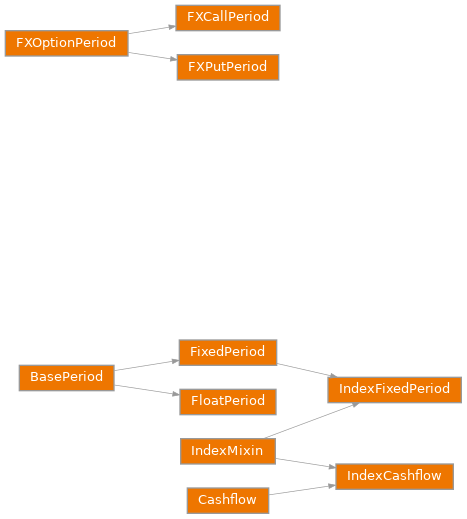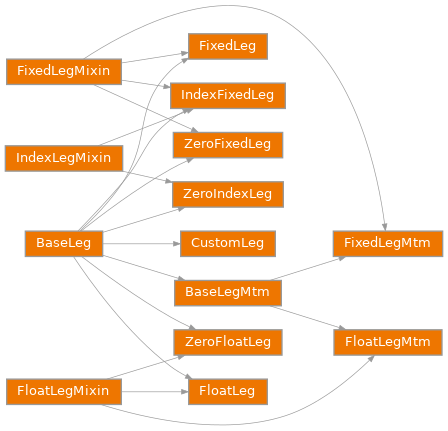API Reference#
Indices and tables#
Notation#
Defaults#
Classes#
|
The defaults object used by initialising objects. |
|
Class to lazy load fixing data from CSV files. |
|
Enumerable type to handle setting default values. |
Calendars#
Functions#
|
Add a tenor to a given date under specific modification rules and holiday calendar. |
|
Create a calendar with specific business and holiday days defined. |
|
Calculate the day count fraction of a period. |
|
Returns a calendar object either from an available set or a user defined input. |
Scheduling#
Classes#
|
Generate a schedule of dates according to a regular pattern and calendar inference. |
Highlighted private functions#
Tests whether the given the parameters define a regular leg schedule without stubs. |
|
Attempts to infer either a front or back stub in an unspecified schedule. |
Piecewise Polynomial Splines#
Functions#
|
|
|
|
|
Evaluate a single x-axis data point, or a derivative value, on a Spline. |
Classes#
|
Piecewise polynomial spline composed of float values on the x and y axes. |
|
Piecewise polynomial spline composed of float values on the x-axis and Dual values on the y-axis. |
|
Piecewise polynomial spline composed of float values on the x-axis and Dual2 values on the y-axis. |
Dual (for AD)#
Functions#
|
Calculate the exponential value of a regular int or float or a dual number. |
Return the inverse cumulative standard normal distribution for given value. |
|
|
Calculate the logarithm of a regular int or float or a dual number. |
Return the cumulative standard normal distribution for given value. |
|
Return the standard normal probability density function. |
|
|
|
|
Return derivatives of a dual number. |
|
Changes the order of a |
|
Convert a float, |
Classes#
|
Dual number data type to perform first derivative automatic differentiation. |
|
Dual number data type to perform second derivative automatic differentiation. |
Curves#
Functions#
|
Return the geometric, 1 calendar day, average rate for the rate in a period. |
|
Return the interval index of a value from an ordered input list on the left side. |
|
Perform local interpolation between two data points. |
Classes#
|
A dynamic composition of a sequence of other curves. |
|
Curve based on DF parametrisation at given node dates with interpolation. |
|
A subclass of |
|
Curve based on value parametrisation at given node dates with interpolation. |
|
A dynamic composition of a sequence of other curves. |
|
A subclass of |
Class Inheritance Diagram#

FX#
Functions#
|
Return a forward FX rate based on interest rate parity. |
Classes#
|
Class for storing and calculating FX forward rates. |
|
Object to store and calculate FX rates for a consistent settlement date. |
Periods#
Link to the Periods section in the user guide.
Classes#
|
Abstract base class with common parameters for all |
|
Create a single cashflow amount on a payment date (effectively a CustomPeriod). |
|
Create an FXCallPeriod. |
|
Create an FX Volatility Smile at a given expiry indexed by delta percent. |
|
Abstract base class for constructing volatility components of FXOptions. |
|
Create an FXPutPeriod. |
|
Create a period defined with a fixed rate. |
|
Create a period defined with a floating rate index. |
|
Create a cashflow defined with a real rate adjusted by an index. |
|
Create a period defined with a real rate adjusted by an index. |
Abstract base class to include methods and properties related to indexed Periods. |
Class Inheritance Diagram#

Legs#
Link to the Legs section in the user guide.
Classes#
|
Abstract base class with common parameters for all |
|
Abstract base class with common parameters for all |
|
Create a leg contained of user specified |
|
Create a fixed leg composed of |
Add the functionality to add and retrieve |
|
|
Create a leg of |
|
Create a floating leg composed of |
Add the functionality to add and retrieve |
|
|
Create a leg of |
|
Create a leg of |
|
Create a zero coupon fixed leg composed of a single |
|
Create a zero coupon floating leg composed of |
|
Create a zero coupon index leg composed of a single |
Class Inheritance Diagram#

Instruments#
Classes#
|
Abstract base class with common parameters for many |
|
Create a discount security. |
|
Create a bond future derivative. |
|
Create a forward rate agreement composing single period |
|
Create an FX Call option. |
|
Create an FXCallPeriod. |
|
Create an FX Volatility Smile at a given expiry indexed by delta percent. |
|
Create a simple exchange of two currencies. |
|
Create an FX Option. |
|
|
|
Create an FX Put option. |
|
Create an FXPutPeriod. |
|
Create an FX Risk Reversal option strategy. |
|
Create an FX Straddle option strategy. |
|
Create an FX Strangle option strategy. |
|
Create an FX swap simulated via a Fixed-Fixed |
|
Create a fixed rate bond security. |
|
Create a floating rate note (FRN) security. |
|
A butterfly instrument which is, mechanically, the spread of two spread instruments. |
|
Create an indexed interest rate swap (IIRS) composing an |
|
Create an interest rate swap composing a |
|
Create an indexed fixed rate bond security. |
|
Create a collection of Instruments to group metrics |
|
Create a single currency basis swap composing two |
|
Create a short term interest rate (STIR) future. |
Base class to add risk sensitivity calculations to an object with an |
|
|
A spread instrument defined as the difference in rate between two Instruments. |
|
A null Instrument which can be used within a |
|
A null Instrument which can be used within a |
|
Create a cross-currency swap (XCS) composing relevant fixed or floating Legs. |
|
Create a zero coupon index swap (ZCIS) composing an |
|
Create a zero coupon swap (ZCS) composing a |
Class Inheritance Diagram#

Solver#
Functions#
|
Concatenate pandas objects along a particular axis. |
|
Calculate the logarithm of a regular int or float or a dual number. |
|
|
|
Return derivatives of a dual number. |
|
Use the Newton algorithm to determine to root of a function searching many variables. |
|
Use the Newton-Raphson algorithm to determine the root of a function searching one variable. |
|
Return the current time in seconds since the Epoch. |
|
Generate a random UUID. |
Classes#
A catalogue of all the gradients used in optimisation routines and risk sensitivties. |
|
|
A numerical solver to determine node values on multiple curves simultaneously. |
Class Inheritance Diagram#

Cookbook#
- Replicating a SOFR Curve & Swap from Bloomberg’s SWPM
- Solving Curves with a Dependency Chain
- How to Handle Turns in Rateslib
- Pricing IBOR Interpolated Stub Periods
- Building a Risk Framework Including STIR Convexity Adjustments
- Exploring Bond Basis and Bond Futures DV01
- Bond Future CTD Multi-Scenario Analysis
- Working with Fixings
- Comparing Curve Building and Instrument Pricing with QuantLib